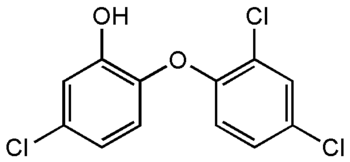Smoking, alcoholism, exposure to radiation are well known causes of cancer but did you know that your hand wash is also a causative agent of cancer lurking around you in your everyday life. To be precise, its not the hand wash that causes cancer but an important ingredient called Triclosan that is the real culprit and unfortunately for us, it is being commonly used in most everyday products such as toothpaste, shampoo, mouthwashes and even deodorants. So, from the time you get up until the time you step out of your house, you are exposing yourself to a bunch of products that are carcinogens (substance capable of causing cancer) and when you step out, you know, you are no better either.
 |
| English: molecular formula of Triclosan (Photo credit: Wikipedia) |
It all began with a small study about soaps which showed that soaps containing triclosan and similar other antimicrobial products performed better at getting rid of germs than soaps that did not. You can find the abstract of the story here. This study prompted manufacturers to start using triclosan in every day products such as deodorants, mouthwashes, toothpaste etc. to give me additional antimicrobial properties. While this might seem a very good idea to apply, the truth is that you that you need significantly large amounts of triclosan in your products for it to be extremely effective otherwise, they are not really better than regular soap. Even the Food and Drug Administration (FDA) in the US has made this very clear on its own page about Triclosan and what consumers should know.




1 comment
[…] According to current and former EPA scientists, this ingredient may cause a lifetime risk of cancer in humans. The EPA’s decision has led to discussions and concerns regarding the agency’s regulatory […]